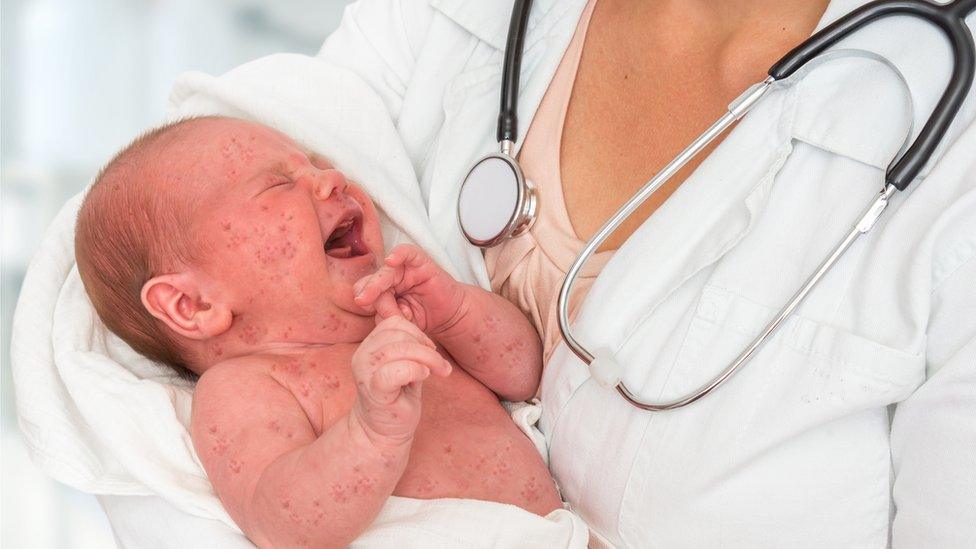Measles: 'My baby's eyes were swollen shut'
- Published
Jilly Moss's one-year-old daughter contracted measles weeks before she was due to be vaccinated
The mum of a baby who had measles so severely that "her eyes were swollen shut for four days", says "parents should know what can happen to vulnerable babies".
Jilly Moss's daughter Alba spent eight days seriously ill in hospital.
She was not old enough to have had the first dose of the MMR vaccine.
More than half a million children in the UK missed out on the vaccine between 2010 and 2017, the children's charity Unicef says.
Globally, 169 million children did not receive the first dose of the measles vaccine over the same seven-year period.
There have been more than 110,000 measles cases worldwide in the first three months of 2019 - a rise of 300% compared to last year, World Health Organization figures show.
It comes as NHS chief Simon Stevens warned that people rejecting vaccines was a "growing public health time bomb".
'Absolutely terrifying'
Alba, who is now one and over the worst, was unwell for a couple of weeks with a high temperature and rash, before it spread and covered her entire body.
At one point, after deteriorating in hospital in south London, Jilly did not think her daughter would survive.
"It was absolutely terrifying to watch her go through that and be so helpless.
"She didn't know what was going on and it was heartbreaking to see," she says.
Measles is a highly infectious viral illness that can lead to serious health complications, including infections of the lungs, eyes and brain. In one in 25,000 cases, brain complications can be fatal.
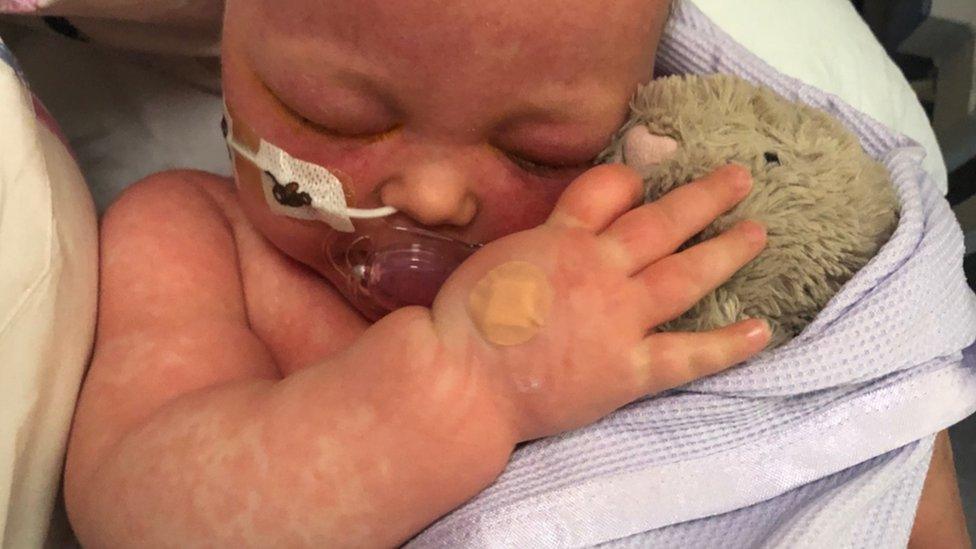
Alba Moss developed a rash with measles that covered her whole body
Babies and children with weakened immune systems are most at risk of complications - more common ones include diarrhoea and vomiting, lung infections and fits caused by a fever.
Millions of lives worldwide have been saved by the measles vaccinations given to young children - but too many are still dying, Unicef says.
Health experts say children should have two doses of the vaccine to fully protect against the disease.
In many countries, including the UK, the MMR vaccine protects against measles, mumps and rubella (or German measles)., external
the first dose is given to babies around their first birthday
the second dose before starting school, when three to four years old
Global problem
But, according to Unicef, a mixture of complacency, misinformation, scepticism about immunisations, and a lack of access to jabs has led to inadequate vaccination rates globally.
It estimates that between 2010 and 2017:
The US topped the list for the number of unvaccinated children in high-income countries, with 2,593,000 missing the first dose of the vaccine
The comparable figure for France was 600,000
The UK came third, with 527,000 children not getting their first dose of the vaccine over the seven-year period
In Nigeria, four million children under one did not get the first dose of the vaccine
The figures are based on Unicef and World Health Organization, external estimates of the number of children immunised against diseases in 194 countries in 2017.
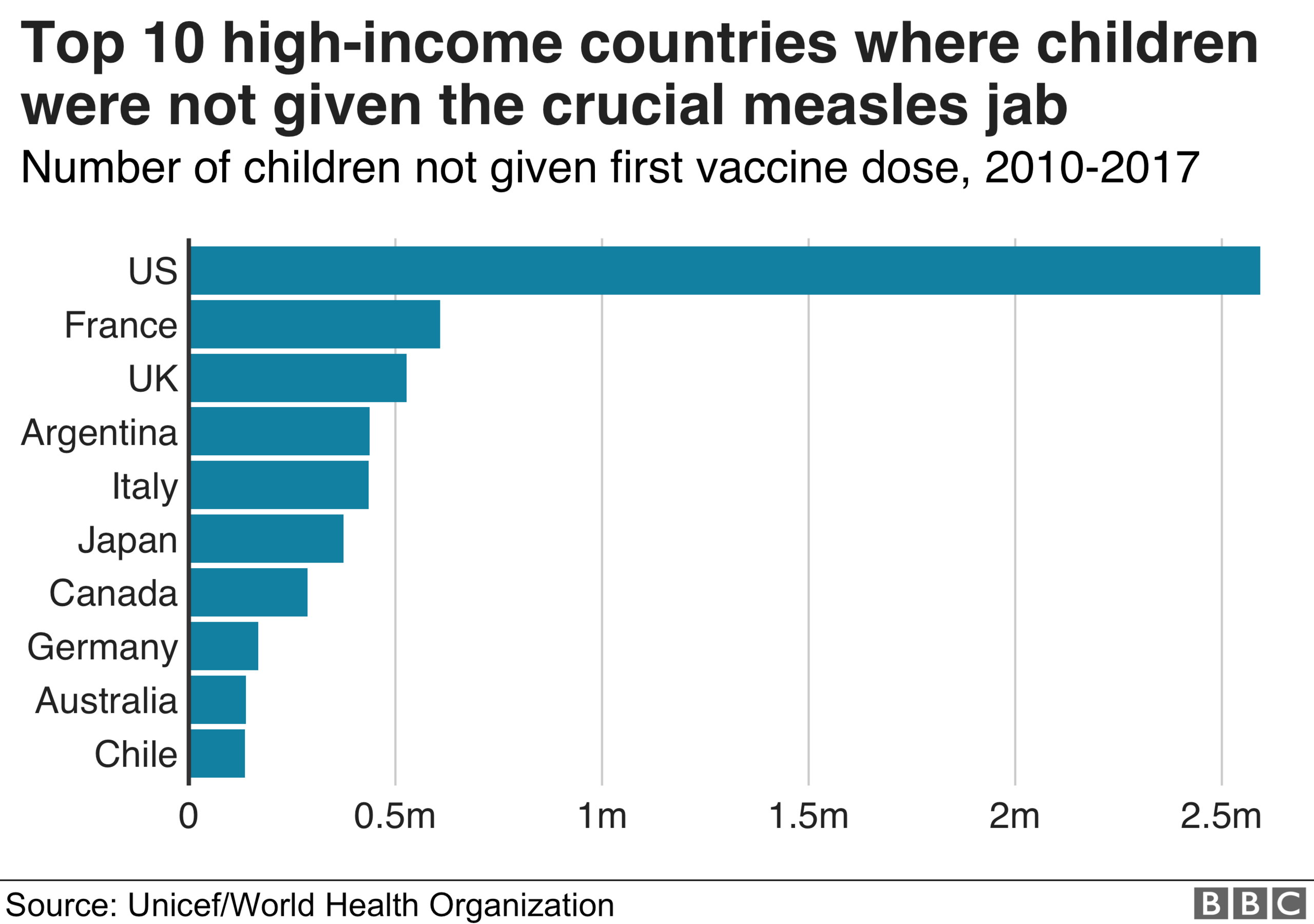
Figures for the second dose of the measles vaccine "were even more alarming", Unicef said.
It found 20 countries in sub-Saharan Africa had not introduced a second dose, putting more than 17 million infants a year at a greater risk of getting measles as a child.
In 2017, 85% of children worldwide were vaccinated with the first dose but only 67% with the second dose of the measles vaccine, Unicef says.
"My daughter's life was destroyed by measles"
'Wake-up call'
Henrietta Fore, executive director at Unicef, said: "The measles virus will always find unvaccinated children.
"If we are serious about averting the spread of this dangerous but preventable disease, we need to vaccinate every child, in rich and poor countries alike."
Prof Beate Kampmann, at the London School of Hygiene and Tropical Medicine, described the figures as a "wake-up call."
She said: "Measles is highly infectious, even before the typical rash appears, so you cannot simply 'keep away'.
"We must protect children and communities against this potentially very serious but entirely preventable infectious disease - and the only way to do that is through vaccination."
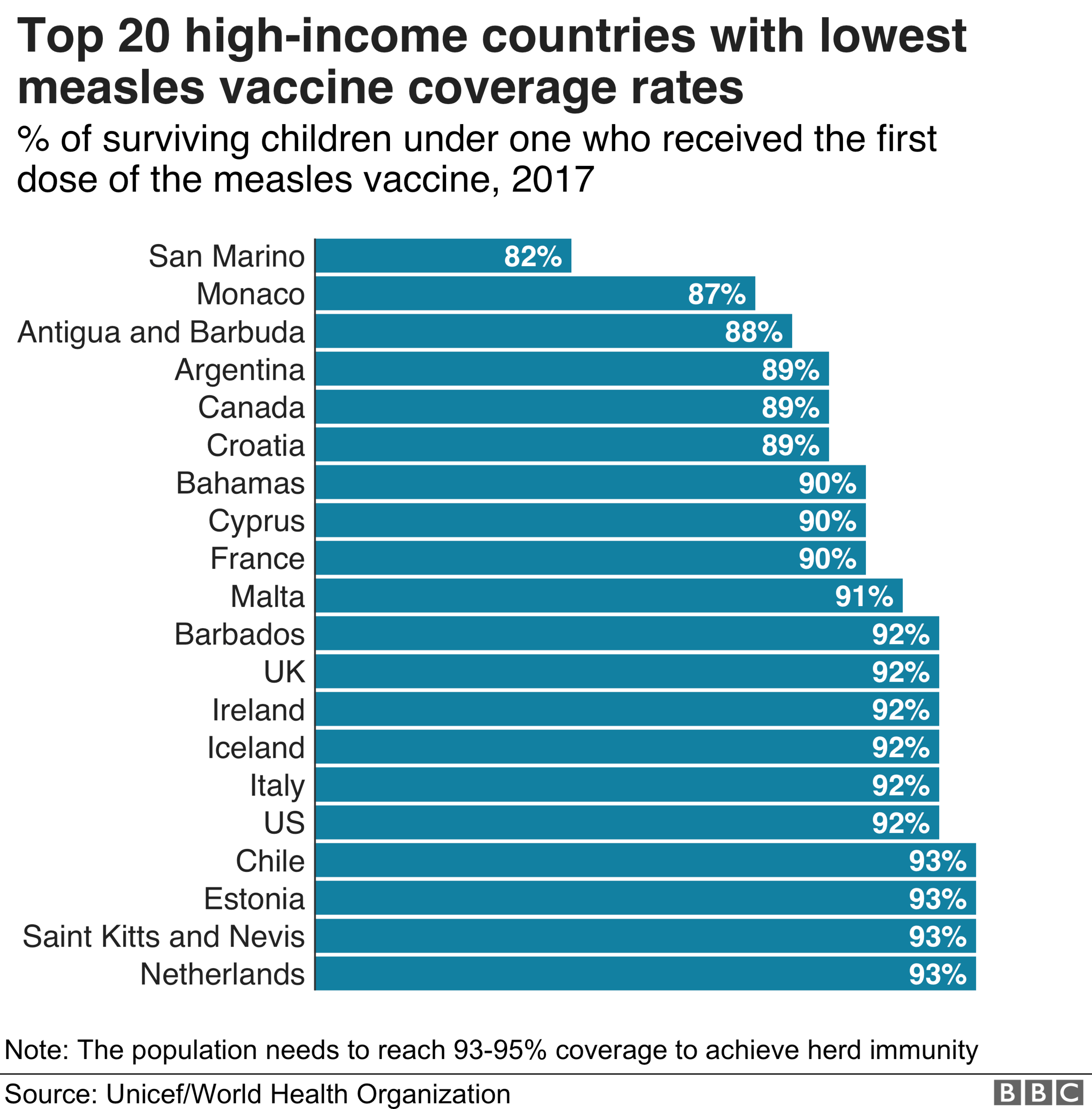
Public Health England said though the overall risk to the public in England was low, unimmunised people were in danger of catching the disease while outbreaks continued in Europe.
The BBC investigated in 2018 why there's been a measles outbreak in Europe
Ukraine, Madagascar and India have been worst affected by the disease so far this year, with tens of thousands of reported cases per million people.
Outbreaks have also hit Brazil, Pakistan and Yemen, while a spike in case numbers has been reported in the US and Thailand.
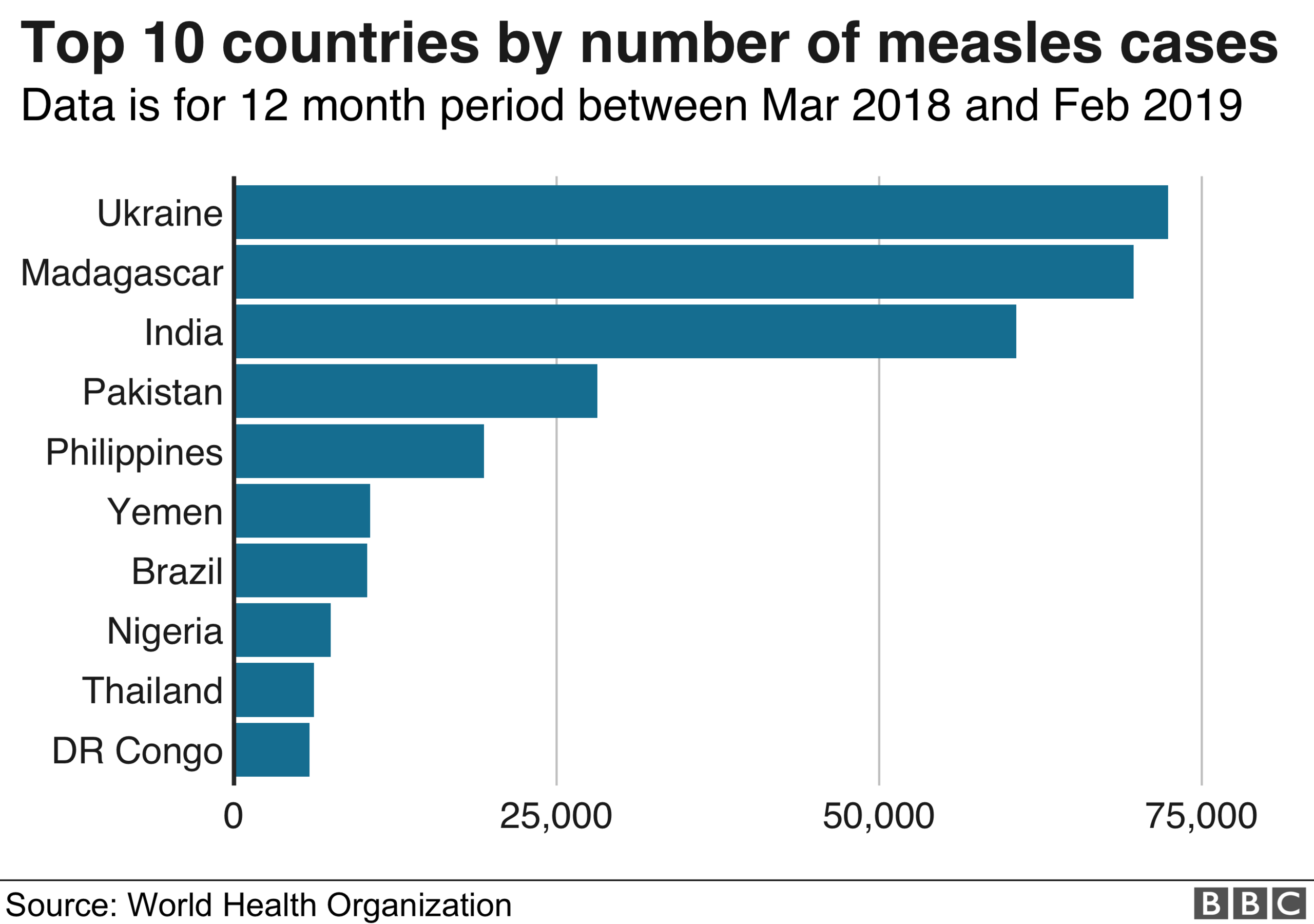
In Greater Manchester, more cases have been recorded this year than in the whole of the previous two years combined.
NHS chief Simon Stevens has warned that "vaccination deniers" have been gaining traction on social media, leading to the spread of misleading information.
The Health and Social Care Secretary, Matt Hancock, has called for new legislation to force social media companies to remove content promoting false information about vaccines.

- Published7 February 2019
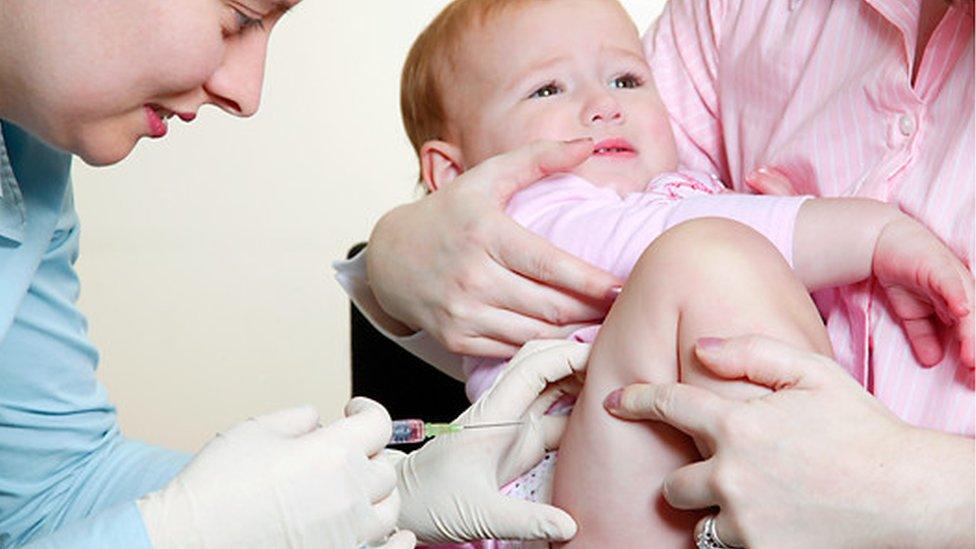
- Published29 November 2018
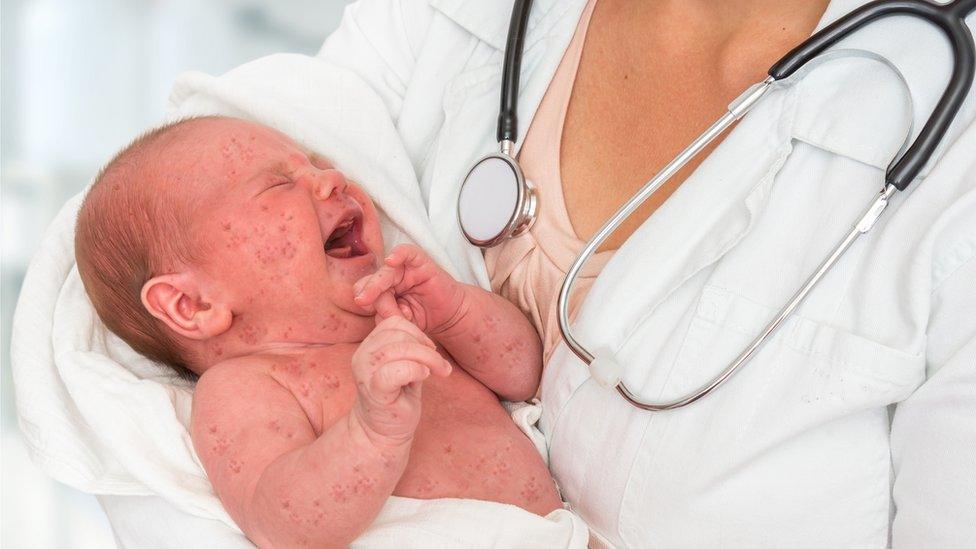
- Published24 April 2019
